WATERVILLE — As mayor of Waterville, Paul LePage often chided state government for passing costs on to cities and towns and putting burdens on local taxpayers.
Just before announcing in 2009 that he planned to run for governor, for instance, the mayor criticized state policies by saying, “We’re paying for their mistakes.”
As LePage, a Republican, begins his second term as governor, Waterville city officials are frustrated that he’s reversed that course with his controversial plan to scrap municipal revenue sharing.
LePage, who was the city’s mayor from 2003 to 2010, acknowledges his thinking changed once he became governor.
“As a governor, you have to look a the bigger picture; and local control is a very, very expensive proposition,” LePage said in an interview. “It’s enormously expensive — far more expensive than I ever imagined. Now I’ve evolved.”
Wearing a Moxie tie and L.L. Bean boots, LePage sat down Monday with the Morning Sentinel at the Alfond Youth Center after he addressed the Waterville Rotary Club about his proposed state tax overhaul and $6.3 billion budget. That bigger picture he now sees as governor shows him that a lot of money is being spent in places it need not be.
While critics say many communities will have no choice but to raise property taxes if there are no options to cut expenses further, LePage rejects the claims that his plan would increase property taxes significantly. But he said regionalization should occur before property taxes go up.
“When I see Lewiston with six administrators and Waterville, Oakland, Fairfield and Winslow have 23 or 24 doing the same exact work, you say, ‘Wow, regionalization does make sense.'”
He had told Rotarians the average school superintendent in Maine has 1,300 students, whereas the average high school in the U.S. has 1,500 students. Maine has 127 superintendents who represent 4.5 percent of $2 billion in education spending, whereas the national average percentage cost of administration in a school district is 2 percent. According to the most recent data available from the Department of Education, in 2012-13, district administration was $62 million and school administration was $109 million, which combined accounted for more than 8 percent of school spending in Maine of just over $2 billion.
LePage said former Democratic Gov. John Baldacci “was absolutely, 100 percent correct about consolidating schools,” but “the problem is, it’s the way he did it. He forced it, and I’m trying to get the Legislature to approve it.”
A Maine Sunday Telegram analysis five years after the school consolidation law took effect found that combined districts achieved modest administrative savings, but that the average district did not reduce overall spending or pass savings along to taxpayers.
In addition to eliminating revenue sharing payments to municipalities, LePage’s plan calls for reducing and ultimately eliminating the state income tax, increasing and broadening the sales tax and allowing municipalities to tax nonprofit organizations. He said the proposal would put more money into taxpayers’ pockets.
Residents never see the taxes they pay on income, he said, adding they also never see the municipal revenue sharing money that comes back to municipalities in which they live.
He said with the extra money, residents, and not the municipality, can decide what services they want and how they will pay for them; and they can decide what nonprofit organizations to support with the extra money they have.
LePage relayed a story about a man from Sabattus who told him his tax plan is wrong. Sabattus gets $221,000 from the state in revenue sharing, but its residents would get to keep $1.15 million in income tax, LePage pointed out to him.
“He says to me, ‘I want the town to get the $1.15 million, but I don’t want to lose the $221,000,'” LePage said. “You can’t have it all.”
MAKING MAINE RICHER
The governor argues that with his plan, more money would stay in a community in the form of income taxes than any amount a community would get through revenue sharing — much more.
Waterville residents pay $9.7 million a year in income taxes, but the state sends the city only $1 million in revenue sharing, he said. Winslow residents pay $7.39 million in income taxes, but the town gets $393,000 in revenue sharing, according to LePage.
His argument does not satisfy Waterville City Manager Michael Roy and Republican Mayor Nick Isgro, who contend towns and cities work to earn revenue sharing and should get the 5 percent they are due. Revenue sharing is used by many communities for services such as police and fire protection, as well as road work.
LePage, who singled out the Waterville city manager during his State of the State address Feb. 3, said in the interview he would tell Roy that “we have income tax due to us, too, and I’m only trying to give it back.”
He’d also pose this question to Roy:
“Do you represent the city of Waterville, or do you represent the citizens of Waterville? That’s the question, because if you represent the city, you have an argument. But if you represent the citizens, you have no argument.”
LePage cites Texas, South Carolina, Florida, Nevada, Arizona and Alaska as having similar budget plans that work well.
“These are all states that are booming,” he said.
His plan, which calls for giving tax credits to those with low and middle incomes, also would mean visitors to Maine would pay a higher sales tax for restaurant food and other goods and services. He said he is confident tourists will not balk at the increased rates.
“Do you think the 18 percent you pay at Walt Disney is turning people off?” he said, adding that hotels in New York City charge 18 percent tax, whereas Maine hotels charge 8 percent.
“This is the point I’m trying to make. People will leave a state on income tax and debt tax, but very few people will not go on vacation because of a percentage more on sales tax.”
An average of 100,000 people an hour go through the York toll booth on a Friday afternoon in summer, he said. In three summer months, Maine takes in $26 million from tourists.
LePage plans to travel to communities around the state two or three times a week to pitch his plan at public forums. His first forum was held Wednesday in Westbrook.
GETTING THINGS DONE
Now in his fifth year as governor, LePage said he is pleased with what he accomplished in his first term because during two of those years he was working with a Democratic House and Senate but managed to get a lot done despite that.
And the voters apparently approved of his work, he said.
“When you come in 49 percent of the vote in a three-person race, that’s a reason to listen,” he said. “If Eliot (Cutler) wasn’t in the race, it would have been 54 to 46.”
The main thing he wants to accomplish in his current term, he said, is eliminate the income tax. The second is to fix schools and ensure more money goes into classrooms.
LePage replied without hesitation when asked what is the biggest misconception about him.
“That I’m a bully,” he said. “When I work with people, that’s not what it’s about.”
He said he gets angry only if people repeat mistakes, say they can’t do something or are afraid to let him know what’s going on. He said he and his wife, Ann, and their family are dedicated.
“We as a family work for the state of Maine,” said LePage. “Our constituency is 1.3 million people.”
He told a story about getting his teeth cleaned at a dentist’s office in Waterville and leaving that office to find a man who had one leg leaning against a car in the parking lot.
“The guy said, ‘I’ve been trying to get a (prosthetic) leg and nobody will help me. Can you help me get a leg?’ He says, ‘If I have a leg, I can work.'”
LePage said he went back to his office and called a woman at the state Department of Health and Human Services, who called him back about a week later. The man got his leg, LePage said.
That’s the sort of problem LePage said he enjoys solving. He said the best part of his job is meeting with Mainers who ask to speak with him in his weekly 15-minute sessions on Saturdays in his office. When he became governor, he launched the Saturday morning talks.
“That’s where I get all my ideas,” he said, adding that the majority of improvements he makes as governor come as a result of suggestions people make at those sessions. “It is amazing what people will share and talk to you about,” he said.
A man from Vassalboro who became severely disabled because of a car accident eight years ago visited LePage twice. At the time of the accident, he told LePage, he had insurance, but the person in the other vehicle did not. The Vassalboro man lost everything, but the uninsured person got off with no penalty, according to LePage.
“We’ve got to fix that law. My feeling is, if you are in a car accident with no insurance, you should get a one-year suspended license; with restitution and the second time, loss of license.”
POLITICAL FUTURE
At 66, LePage said he enjoys his job as governor but has no further political aspirations.
He said he will not run for U.S. House or Senate, for instance. At the start of his State of the State address, he joked that he was the only Republican not running for president — yet.
“Like Clint Eastwood said, a man’s got to know his limitations. I don’t do well on committees.”
But would he consider a run for president?
“No,” he said emphatically. “I’m not interested at all. I never had an interest to get into politics — ever.”
LePage said the reason he ran for Waterville mayor is that when he was a city councilor, he was angry with then-Mayor Ruth Joseph for trying to sell city-owned land on the Kennebec River for $1 in an attempt to spur development there.
LePage was a Republican mayor in a largely Democratic city, and he said residents urged him to run for governor.
“They said, ‘You’d do a good job,'” he recalled.
Is he glad he ran for governor?
“Yes. It’s not for the bashing in newspapers. I despise all that. The best part about being governor is Saturday mornings” talking with Mainers, he said.
A DAY IN THE LIFE
A typical day for LePage starts when he gets up between 6 and 6:30 a.m., has breakfast and heads to his office around 7:40 a.m., he said. His first year in office he worked until 8 p.m. or 8:30 p.m. but then realized his staff never went home until he did, so he changed his schedule and now works until 5 or 6 p.m., he said.
“I work until 9 or 10 p.m. at home, go to bed and read my briefing binder and am asleep by midnight.”
A fan of historical books, particularly those about U.S. presidents, LePage is reading “Reagan at Reykjavik,” which is about the 1986 Reagan-Mikhail Gorbachev summit in Iceland, by Ken Adelman; and “Lincoln’s Hundred Days,” by Louis P. Masur.
“I’ve got to read three or four books at a time,” he said. “I’m also on the last couple chapters of Ulysses S. Grant’s memoirs.”
He has little spare time.
“You don’t really have time off because you’re 24/7. When I go on vacation to Florida or Jamaica, I have my cellphone and tablet. If I take five days in Florida, I work two-and-a-half to three days.”
Despite working long hours, LePage appears rested.
“I’m relaxed and I’m comfortable in my skin. I always have been; and this election, despite what happened in the last four years, we knew we were doing good things. Welfare is down; unemployment is down. We have the highest percentage of the labor force working in America.”
When he leaves office, LePage plans to go kayaking in Boothbay, where he and his wife recently bought a home, he said. He spends time there whenever possible and lately has been setting up his woodworking shop. A longtime woodworker, LePage is making furniture for his daughter, Lauren, who is to be married in the fall.
He has been painting his house and so far has avoided hiring someone to help with that.
“It’s too expensive,” he said.
Amy Calder — 861-9247
Twitter: @AmyCalder17
Copy the Story LinkSend questions/comments to the editors.


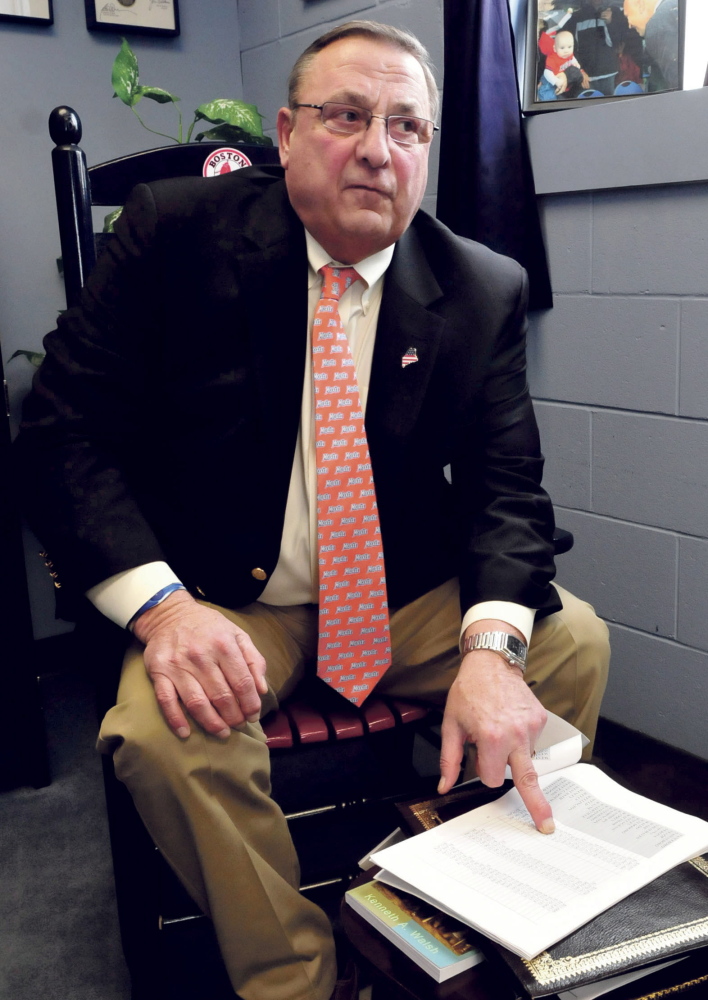
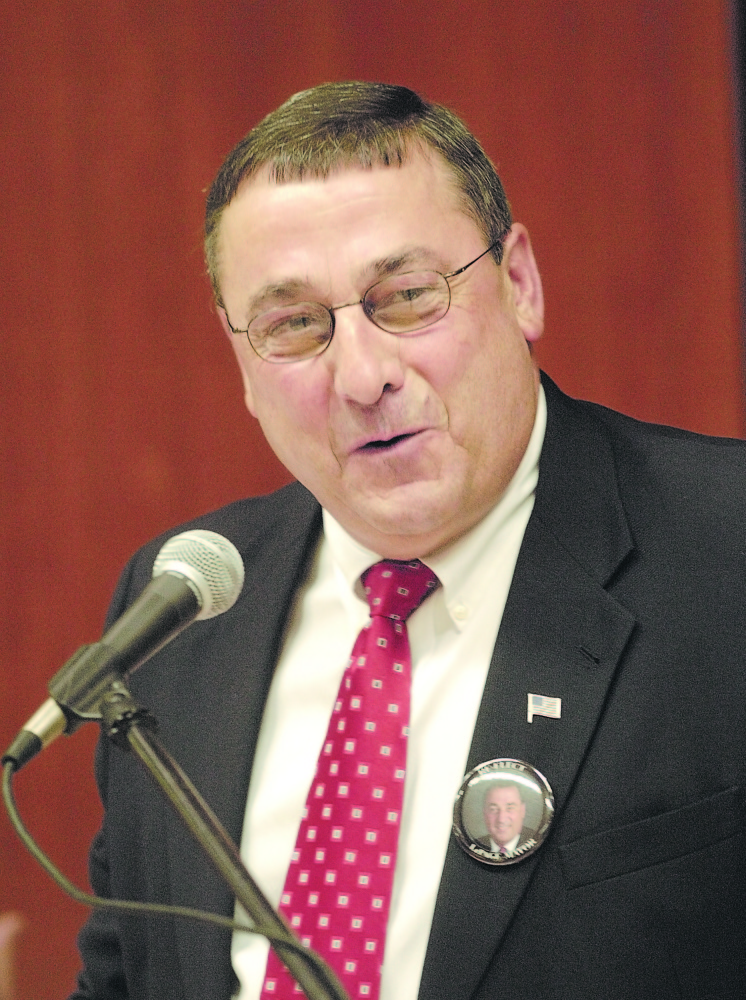
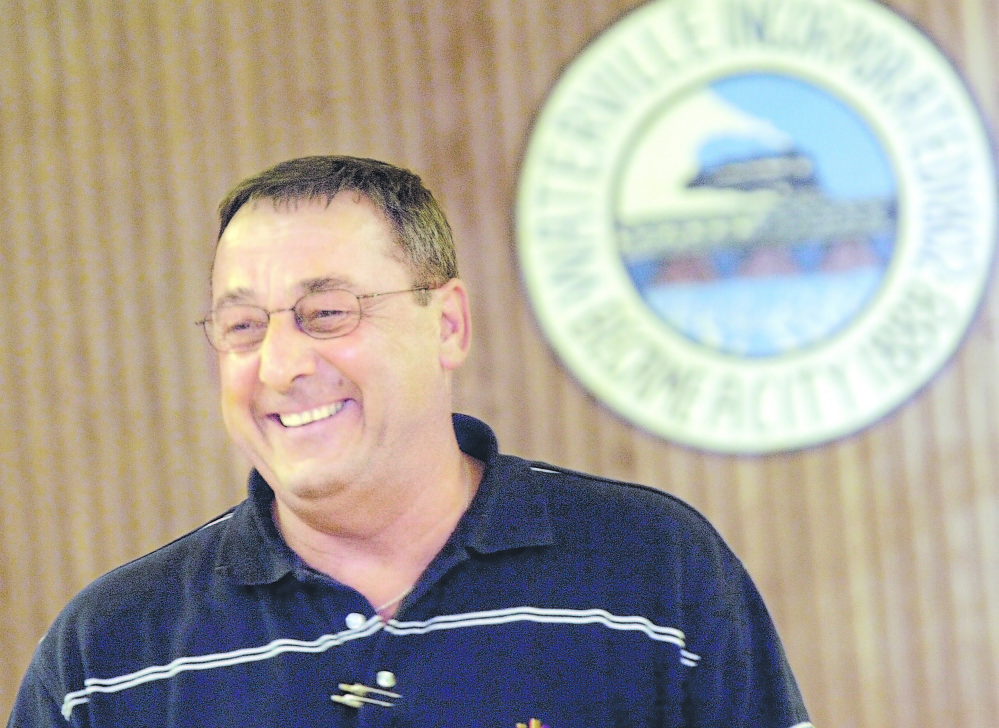
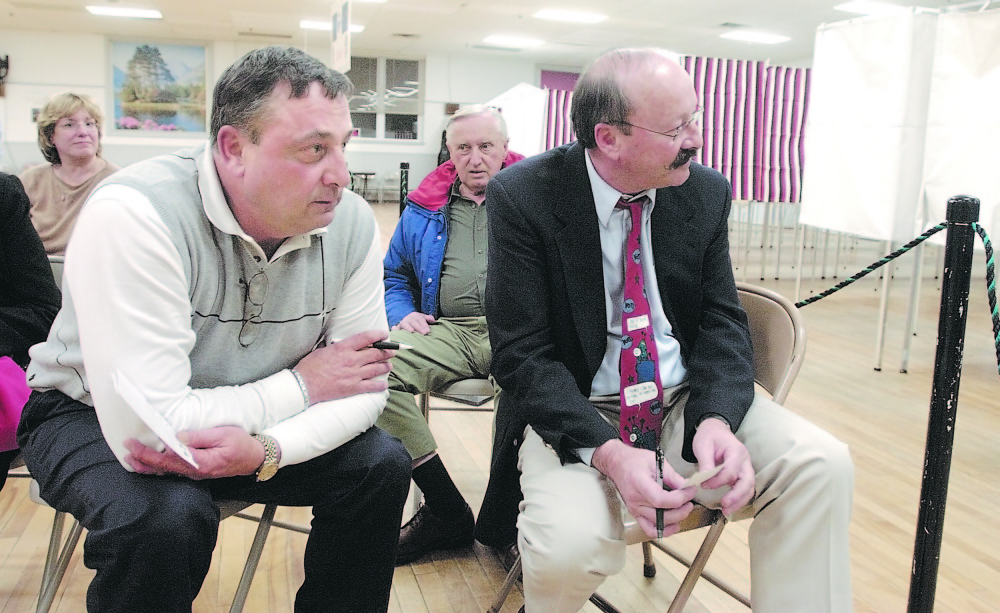
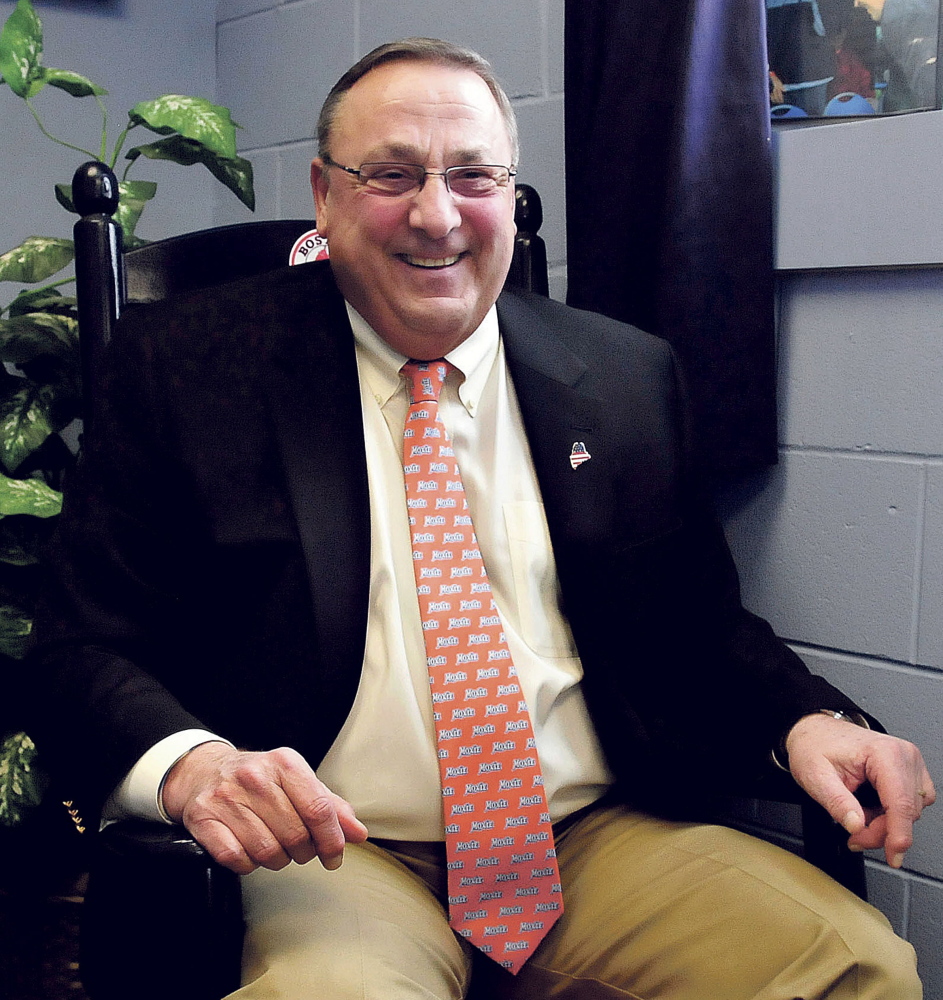

Success. Please wait for the page to reload. If the page does not reload within 5 seconds, please refresh the page.
Enter your email and password to access comments.
Hi, to comment on stories you must . This profile is in addition to your subscription and website login.
Already have a commenting profile? .
Invalid username/password.
Please check your email to confirm and complete your registration.
Only subscribers are eligible to post comments. Please subscribe or login first for digital access. Here’s why.
Use the form below to reset your password. When you've submitted your account email, we will send an email with a reset code.